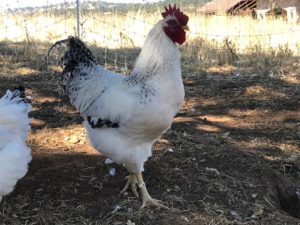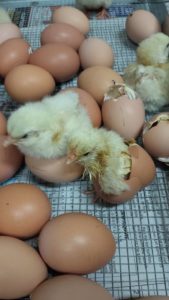PPT087: Breeding Delaware chickens for performance and utility: an introduction to Heritage Poultry Breeders Educational Foundation
Release Date: 07/04/2019
 Highly Pathogenic Avian Influenza and Pastured Poultry Flocks
Highly Pathogenic Avian Influenza and Pastured Poultry Flocks
Pastured Poultry Talk
I have a conversation with Chrislyn Wood, DVM, about the threat of Highly Pathogenic Avian Influenza (HPAI) and pasture raised flocks. Dr. Wood is a veterinarian with USDA APHIS and she is involved first hand with HPAI monitoring and response efforts. We cover a lot of ground, including historical observations, risk assessment, disease identification, and prevention.
info_outline The Days of Wholesale Pastured Chickens are Over for Greg Gunthorp
The Days of Wholesale Pastured Chickens are Over for Greg Gunthorp
Pastured Poultry Talk
Greg Gunthorp joins the show to talk about his decision to step away from pasture raised chickens. Covid plays into the story, of course, but the challenges started long before this virus came to be front page news.
info_outline Turning a 20 year chicken hobby into a farm with Cynthia Capers
Turning a 20 year chicken hobby into a farm with Cynthia Capers
Pastured Poultry Talk
Cynthia Capers, Heniscity Farm in Tennessee, shares her 20+ year journey from hobby chicken keeper to farm. Twenty years ago, the sight of six Black Australorps brought tears to her eyes. Today, she's serving her community through egg sales, chick sales, and pullet sales.
info_outline PPT114 - Small Layer Flock Profitability
PPT114 - Small Layer Flock Profitability
Pastured Poultry Talk
I answer a listener question, "How can I make my small laying hen flock more profitable?" With feedback from the community, insights from The Fighting Farmer, and personal experience, we dive deep into ways to prosper from your small flock of laying hens.
info_outline Perdue Acquires Pasturebird
Perdue Acquires Pasturebird
Pastured Poultry Talk
Perdue acquires Pasturebird and becomes the biggest producer in the space. I unpack what it means on this episode and walk through some history.
info_outline Maintain Production with All In/All Out Rotation for 5,000 laying hens
Maintain Production with All In/All Out Rotation for 5,000 laying hens
Pastured Poultry Talk
Listener Chris asks how to utilize an all-in/all-out pullet replacement strategy without duplicating infrastructure while maintaining egg production. To help answer the question, I share insights from Mark Harrison and Dave and Ginger Shields.
info_outline Community Q&A Plus a Monologue on Heritage Poultry's Role in Pastured (PPT109)
Community Q&A Plus a Monologue on Heritage Poultry's Role in Pastured (PPT109)
Pastured Poultry Talk
I close out the pastured poultry training series with a live streamed Q&A between Terrell Spencer from The Fighting Farmer and myself. We went live on Facebook and fielded questions from our listeners, and this episode of the podcast includes an edited version of that conversation. If you want to watch a replay of the stream, find it on . Before we work into the questions, I offer some thoughts on heritage poultry's potential role in pastured community. APPPA has recently started to focus on breeding specific topics and offers monthly livestreams on breeding. Check out . We cover a...
info_outline Feed Management Tips to Reduce Waste & Maintain Egg Production
Feed Management Tips to Reduce Waste & Maintain Egg Production
Pastured Poultry Talk
In Pastured Poultry Talk episode 110, farmer Matt Steinman discussed how he used fermented feed as a solution to waste and fines. While fermentation can be a viable solution for some people, it's not the only way to deal with fines. This episode unpacks those options.
info_outline Is Fermented Feed Worth the Time for 1,000 hens?
Is Fermented Feed Worth the Time for 1,000 hens?
Pastured Poultry Talk
Farmer Matt Steinman (Foothills Farm in Sedro-Woolley, Washington) and Dr. Louisa Brouwer (technical advisor on the trial) share the results of a SARE-funded trial that sought to understand the economic impacts of feeding fermented feed to laying hens. The trial compared a dry feed, wet feed, and a fermented feed and then determined the net difference across to the bottom line.
info_outline Community Q&A PIus a Heritage Poultry Monologue
Community Q&A PIus a Heritage Poultry Monologue
Pastured Poultry Talk
I close out the pastured poultry training series with a live streamed Q&A between Terrell Spencer from The Fighting Farmer and myself. We went live on Facebook and fielded questions from our listeners, and this episode of the podcast includes an edited version of that conversation
info_outlineHeritage chickens have a stereotype of being slow to grow and low yield, making them a difficult choice for production-based pastured poultry farms. Ok, maybe the stereotype has strong roots in reality. That's why Erin Angulo (Dawnridge Farm) is on the podcast discussing the improvements she has made with her line of Delaware chickens in addition to her work with the Heritage Poultry Breeders Educational Foundation.
Breeding Delaware Chickens for Weight Gain
 As we discuss in the podcast episode, the Delaware has strong roots as an American chicken prior to the development of the faster growing Cornish Cross. The Cornish Cross dislodged the Delaware's popularity. Ultimately that development of the faster chicken growth turned chicken into a common food and sent heritage breeds, such as the Delaware, on a fast track to neglect.
As we discuss in the podcast episode, the Delaware has strong roots as an American chicken prior to the development of the faster growing Cornish Cross. The Cornish Cross dislodged the Delaware's popularity. Ultimately that development of the faster chicken growth turned chicken into a common food and sent heritage breeds, such as the Delaware, on a fast track to neglect.
Seventy years removed from the Delaware chicken's popularity, breeders like Erin are trying to restore their potential.
Just how far has she come? Her first batch of chickens yielded a 3.5 lb carcass in 16 weeks. That's very common of heritage chickens, and probably above average for most people who try the heritage chickens today. Five years later, Erin has selected her cockerels to achieve a 3.5 lb. to 4.5 lb. carcass in 12 to 13 weeks. The variance in slaughter time is due to processing availability.
That improvement is not going to put the Delaware back into mainstream production, but it's true to historical breed standards, and it's the kind of improvement that would make Delaware meat chickens a potential option for more farms. As a comparison, many of the slow growing hybrids are bred for 12 week grow outs with average yields a couple pounds heavier.
Heritage Chicken Breeding Strategies
 In the episode, Erin shares her basic approach to breeding Delawares, and it's not complicated. She doesn't use any specially formulated feed. Instead, she weighs birds twice a month to track the weight gain of each developing bird. When she makes final selections in September, she has already handled each bird for eight months and is knowledgeable about what she's looking for and familiar with the birds. Her success is hands on.
In the episode, Erin shares her basic approach to breeding Delawares, and it's not complicated. She doesn't use any specially formulated feed. Instead, she weighs birds twice a month to track the weight gain of each developing bird. When she makes final selections in September, she has already handled each bird for eight months and is knowledgeable about what she's looking for and familiar with the birds. Her success is hands on.
When selecting breeders, Erin only selects the birds that are as good or better than the father. In a recent season, that meant she kept 3 cockerels out of 75.
Heritage Poultry Breeders Educational Foundation
Erin discovered heritage chickens through Sustainable Poultry Network (SPN) and was an active member of that association. As SPN restructured and different community needs arose, she was a founding member of the Heritage Poultry Breeders Educational Foundation (HPB). HPB became a separate organization with it's own mission to create a community of poultry breeders and enable sharing, educating and developing a knowledge base needed to improve and restore standard breeds to their original purpose.
HPB's niche is declared in the name of the organization, and it aims to make deep breeding knowledge accessible to a wider audience. As a startup organization, there is untapped potential waiting for new breeders to jump in and engage the community. Check them out - I'm a member.
Contact for Erin and Heritage Poultry Breeders
Heritage Poultry Breeders Educational Foundation: website | Facebook | Instagram
Dawnridge Farm: Facebook | [email protected]
Resources from the Episode
- The Fighting Farmer Episode 44
- American Pastured Poultry Producers Association
- Livestock Conservancy
- Smokey Buttes Ranch
- Peak Poultry
- The Fertrell Company
- Sustainable Poultry Network
Topic Timestamps [mm:ss]
- 01:02 Introduction to heritage birds through SPN
- 05:12 Delaware breeding improvements
- 06:30 Feeding and and selection process
- 10:12 Egg laying capabilities of Erin's Delaware chickens
- 11:39 Biggest problems: predators and color pattern on males
- 13:21 Advice to new heritage poultry breeders: choose correctly
- 18:33 Introduction to Heritage Poultry Breeders Educational Foundation
- 19:00 Goal of Heritage Poultry Breeders is to reach anyone raising heritage poultry
https://pasturedpoultrytalk.com/2015/07/24/ppt013-not-a-backyard-chicken-club-jim-adkins-interview-part-1-2/
